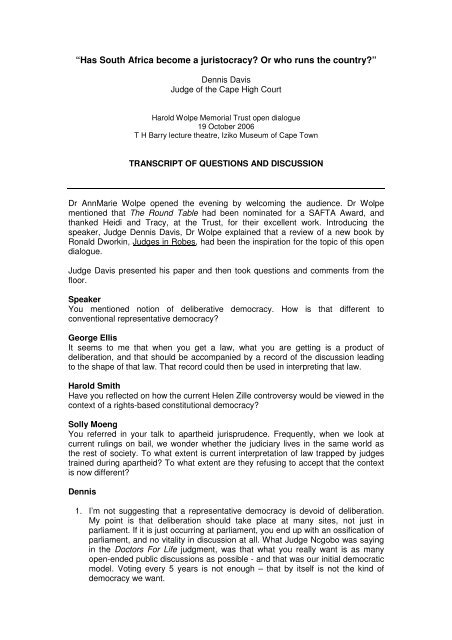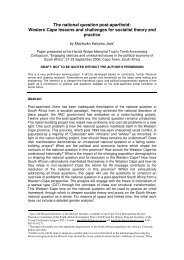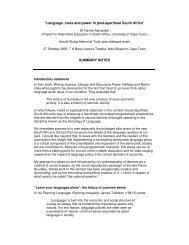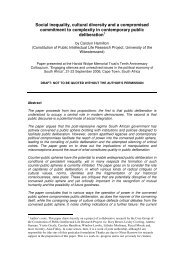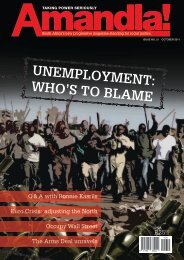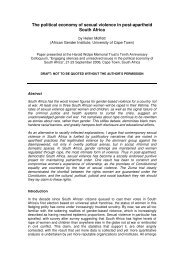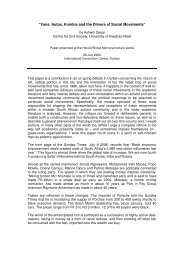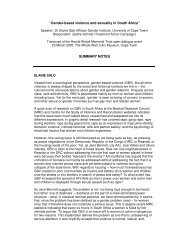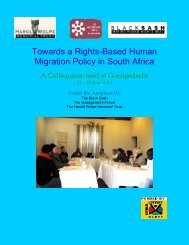Transcript - The Harold Wolpe Memorial Trust
Transcript - The Harold Wolpe Memorial Trust
Transcript - The Harold Wolpe Memorial Trust
- No tags were found...
You also want an ePaper? Increase the reach of your titles
YUMPU automatically turns print PDFs into web optimized ePapers that Google loves.
“Has South Africa become a juristocracy Or who runs the country”<br />
Dennis Davis<br />
Judge of the Cape High Court<br />
<strong>Harold</strong> <strong>Wolpe</strong> <strong>Memorial</strong> <strong>Trust</strong> open dialogue<br />
19 October 2006<br />
T H Barry lecture theatre, Iziko Museum of Cape Town<br />
TRANSCRIPT OF QUESTIONS AND DISCUSSION<br />
Dr AnnMarie <strong>Wolpe</strong> opened the evening by welcoming the audience. Dr <strong>Wolpe</strong><br />
mentioned that <strong>The</strong> Round Table had been nominated for a SAFTA Award, and<br />
thanked Heidi and Tracy, at the <strong>Trust</strong>, for their excellent work. Introducing the<br />
speaker, Judge Dennis Davis, Dr <strong>Wolpe</strong> explained that a review of a new book by<br />
Ronald Dworkin, Judges in Robes, had been the inspiration for the topic of this open<br />
dialogue.<br />
Judge Davis presented his paper and then took questions and comments from the<br />
floor.<br />
Speaker<br />
You mentioned notion of deliberative democracy. How is that different to<br />
conventional representative democracy<br />
George Ellis<br />
It seems to me that when you get a law, what you are getting is a product of<br />
deliberation, and that should be accompanied by a record of the discussion leading<br />
to the shape of that law. That record could then be used in interpreting that law.<br />
<strong>Harold</strong> Smith<br />
Have you reflected on how the current Helen Zille controversy would be viewed in the<br />
context of a rights-based constitutional democracy<br />
Solly Moeng<br />
You referred in your talk to apartheid jurisprudence. Frequently, when we look at<br />
current rulings on bail, we wonder whether the judiciary lives in the same world as<br />
the rest of society. To what extent is current interpretation of law trapped by judges<br />
trained during apartheid To what extent are they refusing to accept that the context<br />
is now different<br />
Dennis<br />
1. I’m not suggesting that a representative democracy is devoid of deliberation.<br />
My point is that deliberation should take place at many sites, not just in<br />
parliament. If it is just occurring at parliament, you end up with an ossification of<br />
parliament, and no vitality in discussion at all. What Judge Ncgobo was saying<br />
in the Doctors For Life judgment, was that what you really want is as many<br />
open-ended public discussions as possible - and that was our initial democratic<br />
model. Voting every 5 years is not enough – that by itself is not the kind of<br />
democracy we want.
<strong>Harold</strong> <strong>Wolpe</strong> <strong>Memorial</strong> <strong>Trust</strong> open dialogue, 19 October 2006, Cape Town<br />
In terms of institutional viability, it will be viable only if the three components<br />
(the legislature, the judiciary and civil society) are running at same time. It is<br />
saddening to see that civil society action is very sparse at the moment, except<br />
for one or two very active movements like the TAC.<br />
If you, as a movement, are organised, you can bring about change. People<br />
often say things like: “All the courts care about are gay and lesbian rights” – but<br />
that is because the gay and lesbian civil society movement is working so hard<br />
to put those issues before the courts! Unfortunately, many other groups of<br />
people are simply not organized.<br />
2. Many years ago in the House of Lords case, Pepper v Hart, it was accepted<br />
idea that Hansard (a literal transcript of the Legislature’s deliberations) was<br />
acceptable as evidence in interpreting the text of legislation. It has never been<br />
seen here, I don’t think. Bear in mind that it’s not just judges who can bring in<br />
evidence as to interpretation of a statute – lawyers can too, in fact it is their<br />
job to place that evidence before judges. <strong>The</strong>y can be quite creative in what<br />
they place before us to help us interpret.<br />
3. I’m afraid I won’t answer on the Zille debate! (laughter) <strong>The</strong> dispute may well<br />
come to the Cape High Court, so I don’t want to answer that question.<br />
4. I’m not here to defend every judge, I defend only the institution. Judges do<br />
make mistakes, often - but when we make mistakes there is, at least, a right<br />
of appeal (unlike with doctors, I may add)! I think some judges are living in a<br />
different world; I accept that that may be the case. I certainly wouldn’t suggest<br />
that every single judge has rushed headlong into embracing the<br />
transformational project.<br />
But I do think that increasingly, the cases where black life is regarded as less<br />
than white life are becoming a minority at the judicial level. Clearly there are<br />
greater problems at magistrate level – but magistrates and judges not the<br />
same. As we move further into the judicial appointment procedures of the<br />
twenty-first century, we will have fewer and fewer of these kinds of decisions.<br />
You raise the point as to what kind of judge we should appoint. Race and<br />
gender are necessary conditions for selection of judges, but not sufficient<br />
conditions. We are finally getting a more sophisticated training programme off<br />
the ground, and that will help as well.<br />
Let me make two final points: when you have a crime wave like ours, the<br />
judiciary is under massive strain. A judge is required to balance the rights of<br />
an accused with the justifiable claims of society in general and victims in<br />
particular. Under that kind of pressure, mistakes are made. I myself have<br />
often agonised over bail decisions; they can be very hard to make. Finally,<br />
you are correct: values make a huge difference and that is why, when we<br />
appoint judges we should have a proper debate about the appointments. That<br />
debate must be one where the public participates. I believe all interviews of<br />
judicial applicants should be on the radio. <strong>The</strong>n the public could comment<br />
meaningfully on those applicants. <strong>The</strong> media has not served us well in this<br />
regard.<br />
2
<strong>Transcript</strong> of questions and discussion<br />
While I’m talking about the media, I should say that generally the press does<br />
an appalling job in the reporting of cases – they twist and alter them<br />
unacceptably. We should have a far higher standard of reporting on cases.<br />
John Gosling<br />
In terms of the Constitutional Court, the Constitution and a participatory democracy -<br />
the CC has handed down a decision on gay and lesbian marriage. <strong>The</strong> Legislature<br />
has decided to offer a bill, inviting public participation, with a commission holding<br />
public hearings. At those hearings, the majority expresses the view that same-sex<br />
marriage is undesirable. Who is going to make the final decision<br />
Mervyn Bennun<br />
Your comment about what Judge Murphy wrote in the Cape Times - I found Judge<br />
Murphy’s sentiments horrifying, and they terrify me. However, I think we need to<br />
refine our response to them – what exactly is making us so angry I think the real<br />
problem was Murphy’s call for changes to the Bill of Rights, and the call for a<br />
referendum to achieve that. We know that frequently judges appeal to Parliament to<br />
change legislation that judicial consideration has found to be flawed – there is<br />
nothing problematic about that. What is disturbing is that a judge sees fit to call for a<br />
change in the Bill of Rights.<br />
David Lewis<br />
What have we lost or gained in terms of self-authorship by not using a jury system<br />
Surely a majority system requires that representatives of ordinary people have a role<br />
to play in judging others in court<br />
Patrick Melley<br />
I’ve had some experience with political parties, and I think it’s true to say that many of<br />
the smaller parties are working against the very objectives they’re trying to achieve,<br />
because of their desire to be in Parliament. If they were to disband and set up a civil<br />
movement instead of a political party, they would probably achieve a great deal<br />
more. Freedom Front Plus is a prime example of a small political party who expends<br />
so much of their effort and resources on getting into Parliament that they have little<br />
time left to achieve other objectives.<br />
Dennis<br />
1. At the end of the day the CC will decide whether the Civil Union Bill meets the<br />
strictures it laid down in its judgment. I thought it was quite clear what the<br />
court said, and I don’t think there’s much room for the legislation to go beyond<br />
that, or fall short of that. We have seen the Parliamentary law advisor on TV a<br />
number of times, saying that he wasn’t satisfied with earlier drafts because<br />
he’s concerned about constitutionality, and I suspect that he is very alert to<br />
the fact that the Bill must meet the CC’s requirements. If the Bill doesn’t meet<br />
the CC’s strictures, it may nevertheless be justified, but that is the CC’s<br />
inquiry, and the burden will be on the Legislature to show why it is justified.<br />
2. <strong>The</strong> only point I want to make is that you are absolutely right. What disturbs<br />
us is the mention of a referendum as the basis for a change of the Bill of<br />
Rights. Our job as the judiciary is to promote our constitutional democratic<br />
enterprise as best we can. It is not for judges to advocate referenda or other<br />
majority-rule mechanisms, which undermine a constitutional democracy.<br />
3. Many years ago I wrote an article calling for a jury system. I was flush with the<br />
influence of EP Thomson, who had written eloquently that the jury system in<br />
3
<strong>Harold</strong> <strong>Wolpe</strong> <strong>Memorial</strong> <strong>Trust</strong> open dialogue, 19 October 2006, Cape Town<br />
early England was one of the greatest triumphs of democracy. When I wrote<br />
that piece, John Didcott wrote to me in response and he said: juries don’t give<br />
reasons, and reasons are important. We debated this quite a bit. I have<br />
always been in favour of a jury system. It would be a bold move in SA, but if<br />
we have faith in humanity, it could work. What is odd to me is that no-one has<br />
ever taken it up, since then. It’s simply not an issue on the public agenda.<br />
4. Small political parties have the right to be political parties - if they’re not<br />
successful that’s their problem. I actually think it’s important that they’re in<br />
Parliament. I think that at the end of the day, the whole point is to allow many<br />
parties to be in Parliament. Of course we must have some kind of threshold<br />
as to who qualifies as a ‘party’ that can sit in Parliament, otherwise it can<br />
become absurd.<br />
Mpumelelo<br />
I know of three judges now who have expressed regret that Constitution doesn’t<br />
allow the death penalty. Two expressed that in handing down a judgment in a case<br />
where a boy had killed a family. <strong>The</strong>y implied that if the death penalty were available,<br />
it would be the ultimate penalty.<br />
<strong>The</strong>re are three points there. It might be a bit of populism, since there’s a lot of<br />
comment that a referendum on the death penalty would result in a ‘yes’. <strong>The</strong><br />
Constitution gives people some kind of freedom to express their opinion. But at<br />
another level, the Constitution prohibits the death penalty, and this was found in one<br />
of the first judgments delivered under our new Constitutional democracy. How do we<br />
balance these conflicting tensions and rights – the right to life and so on, but also the<br />
right to express your opinion as a judge<br />
Mike Tomlinson<br />
<strong>The</strong> sub judice rule was introduced when we still had the jury system. Is the rule still<br />
relevant, and does it allow people to hide behind it<br />
Speaker<br />
During the public hearings on the Civil Union Bill, one speaker made a comment to<br />
the effect that there will come a time when the CC itself will become unconstitutional,<br />
because Parliament is the elected body, and yet its hands are tied.<br />
Speaker<br />
I’m not sure as to your position on Judge Murphy’s opinion. To what extent, in your<br />
mind, may judges engage publicly, and where do you draw the line with regard to<br />
judges expressing themselves in public<br />
Dennis<br />
1. & 4.<br />
On public opinion: I imagine that most people would favour the death<br />
penalty. <strong>The</strong> point is that the Constitution is not about public opinion.<br />
<strong>The</strong>re are some values that are placed beyond the reach of public<br />
opinion, which is a transient and vacillating thing. We have to be<br />
extremely cautious with public opinion. I am almost certain that if the<br />
crime wave decreased, the cry for the death penalty would go away.<br />
That’s what I mean about the transience of public opinion.<br />
3. Of course judges are entitled to free of speech. But I, as a judge, draw the<br />
line on the basis of the oath I took to uphold the Constitution, and I believe<br />
4
<strong>Transcript</strong> of questions and discussion<br />
it’s my job to uphold it in every way possible. I don’t see it as my role as a<br />
judge to attack the Constitution. <strong>The</strong> group who is supposed to be the<br />
custodians of that document should not be playing that role if they don’t<br />
support it wholeheartedly.<br />
At the end of these 10 years, we are not out of the woods. Sometimes<br />
public opinion feels that CC itself has become unconstitutional, as<br />
someone mentioned. As judges, we must constantly repeat how important<br />
and precious that document is, because it reflects us as a society at our<br />
best. Judges must stand by their job as custodians. If I go beyond that<br />
line, I should be criticized.<br />
I’ve seen many more judges coming out into the public arena and<br />
engaging with issues recently, and the public liked it. I understand that<br />
people may say, in anger, that one day we’ll reach the point where the<br />
illegitimacy of the CC will cause us to throw the whole court out. I think we<br />
teach people the importance of a constitutional democracy by showing<br />
them that where they lose something, they gain something. If one right is<br />
denied, it makes it that much easier to deny the next one, until we have<br />
nothing left.<br />
2. <strong>The</strong> sub judice rule: it’s not a bad idea to have such a rule, although it’s<br />
not always effective. It has been abused to a large degree. Given the way<br />
in which freedom of expression has been expanded in South Africa, there<br />
is far less of a restraint on speech than there was before.<br />
Inge Lawson<br />
I accept the philosophical highground of having no death penalty, but having one of<br />
my family becoming part of the statistics of people who have been raped, I must ask:<br />
how do we act to protect ourselves and what other solutions are we seeking to<br />
protect ourselves I work in trauma counseling centers, and in my experience the<br />
true statistics of crime are being suppressed. What other solutions are we looking at<br />
Dennis<br />
When you sit as a judge and you try these cases and see the families, it is very hard,<br />
especially where the police investigation is botched up.<br />
Inge<br />
I must interject there: I have a lot of sympathy for the police given the appalling<br />
circumstances in which they work, and I believe that not one of us sitting here could<br />
do a better job.<br />
Dennis<br />
I accept that, but what I am saying is that it’s harder at one end where the other end<br />
is not working as it should. We do need to do something about our police force – they<br />
have to do better. <strong>The</strong> police, however, are only a small part of it. If you go into the<br />
old ‘coloured and black’ areas and witness that crushing poverty, are we seriously<br />
surprised that people get into drugs and gangs<br />
We need to reconstruct the residential and social structures of our society. Those<br />
issues are infinitely more important than reintroducing the death penalty. Another<br />
massive part of the problem is unemployment. <strong>The</strong> point I’m making is that the cry to<br />
bring back the death penalty is a pathetic cry, because it will not make much of a<br />
difference. It will not make the difference we want. To a large extent we need a<br />
5
<strong>Harold</strong> <strong>Wolpe</strong> <strong>Memorial</strong> <strong>Trust</strong> open dialogue, 19 October 2006, Cape Town<br />
holistic solution to this, and to suggest that absence of the death penalty is the root<br />
cause of our crime is simply not true.<br />
AnnMarie closed the evening by thanking the audience and the speaker, and by<br />
mentioning that the last open dialogue of 2006 will probably focus on the issue of<br />
crime, so that anyone interested in that issue should keep a lookout for the date and<br />
time of that dialogue.<br />
6


